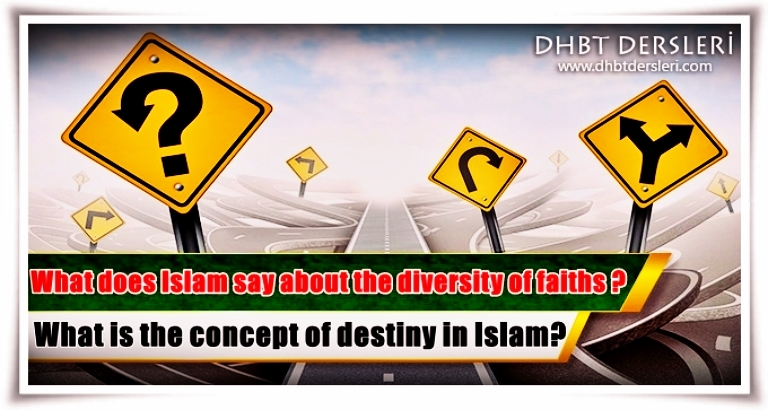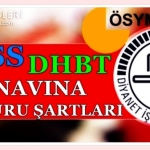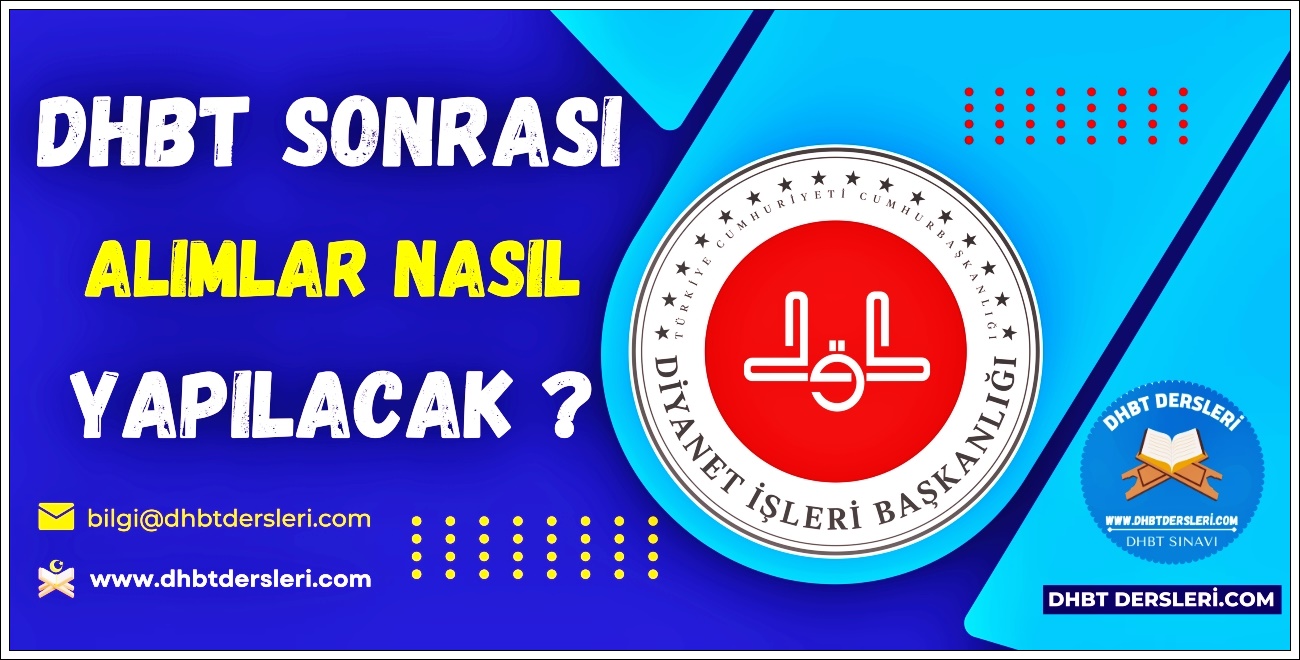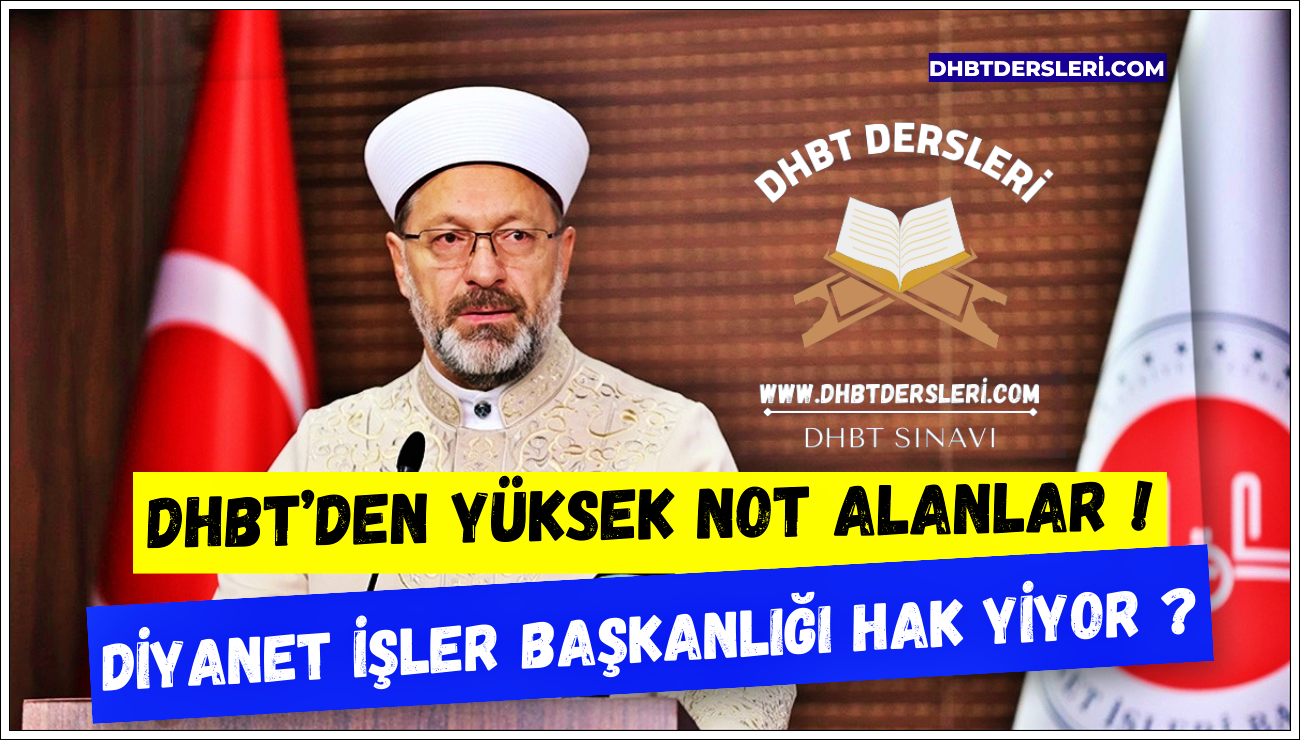What is The Concept of Destiny in İslam ?
The Qur’an unequivocally and explicitly states that Allah is almighty and powerful over anything. Every single being animated or not—exists and ceases to do so at when fate prescribed by Allah reaches them. Nothing can happen or exist outside the laws of Allah. He has created everything with laws, rules, proportions and measures. He does not create anything without a purpose and He does not act in vain. This is what “He foreordained everything” means. “Nothing is out of His foreordainment” means every creation is bound to His laws.Allah has subordinated destinies of all seen and unseen creations devoid of will to laws He established. The revelation calls those laws “the sunnah (tradition) of Allah” (sunnatullah). Allah teaches the truth and His laws not only in textual verses in the books He revealed, but also in the whole universe itself. In that respect, universe is also a book for the ones who can read (Fussilat 41:53).
For instance, the destiny a creature devoid of will is subject to is a sunnah of Allah. There is no and can be no alteration or inconsistency in the sunnah of Allah. Concerning creations who have will and reason—humans:
1. Conditions and events beyond their will’s scope: the human DNA and RNA, the blood type, genes, skin-color and height, for instance, are realms that lie beyond one’s will. These, too, come around in accordance with the sunnah and destiny of Allah.
2. Conditions and events within their will’s scope: Allah granted the free will to human kind as a trust. The will itself is a destiny Allah prescribed to His creations. Humans are responsible for actions committed willfully. It is Allah who granted will to humans and who will hold them responsible for willful actions. In those situations where humans act willfully, the destiny of choosing confronts them.
Allah Almighty wants humans, the best of creations, to use their will. Thus, there is a link between human actions and His actions, elevating humans’ status. From this perspective, the human enjoy the honor of making history with Allah. Allah granted partial freewill to humans. Whatever and whoever, both seen and unseen to humans, exists in this world does so because Allah destined them to exist.
The Lord of the worlds Allah prescribed “static destiny” for creatures without will, while creatures with will are prescribed “dynamic destiny.” Granting will to humans is yet another destiny Allah prescribed. Whenever humans employ will, they act in line with the destiny Allah prescribed. Allah created the human kind in the best mold and He wishes him to use the freewill for everything they can choose. For this reason, He incorporated the free will of human kind into His absolute will.
This way, Allah established a tie between His will and the free-willed actions of human beings. He made the human kind an active participant in the life who could choose his own destiny. With this position, human kind has received the honor of being able to influence the time and make history. The will of Allah is unchangeable and unconditional, while the human will is changeable and conditional. The conditional and changeable will of humans is not parallel or independent to the unconditional and unchangeable will of Allah. The limited will of humans is within the unlimited will of Allah. Therefore, the Qur’an states, “You cannot will it unless Allah wills” (‘Insan 76:30).
However, Allah wants humans to wish and to want. Humans are, therefore, responsible for actions committed willfully and consciously. The Qur’an does not approve of any approach that would claim “the human is forced to accept choices made for him by a different authority,” or “humans have no choice,” or “humans have no say in their destiny,” or “human is like a programmed entity that will perform all what is predestined for him.” Such a concept would destroy humans’ moral responsibility, which is the basis for moral actions and behavior. If that basis were removed, expecting humans to behave responsibly would be unwise, indeed unjust. Consequently, there would be no sense in such notions as reward and punishment, and Paradise and Hell.
If these concepts were rendered meaningless, then there would be no justification for belief in the hereafter. Humans make choices using will. The only choice they were not given is whether to have that very will or not. Creator chose to create humans with will. The divine will granted will and reason to humans. Humans face two choices virtually at all times. However, no choice of being a creation with will or without was given to humans. Allah exercised His right to grant and ordain will to humans.
Allah made a choice and chose to create humans with will. From then on, the human shall accept and surrender to this will of the Creator, and then prove his acceptance by exercising his freewill. What makes us “human” is mainly the free will. In other words, humans’ freewill is a destiny, and humans cannot escape their destiny, their freewill in this case. Making choices is humans’ destiny and humans are obliged to choose wisely. From this perspective, any argument that humans have no choice would also mean that humans are devoid of will. This is the interpretation of âyahs stating, “But you cannot will it unless Allah wills.”
What is the relation the Qur’an builds between freewill and fate/destiny?
“And every human being’s destiny have We tied to his neck” (‘Isra’ 17:13)
“Every human being will be held in pledge for whatever [evil] he has wrought” (Muddaththir 74:38; also see : 52:21)
“It may not accord with your wishful thinking – nor with the wishful thinking of the followers of earlier revelation – [that] he who does evil shall be requited for it…” (Nisa’ 4:123)
“Whenever they commit a shameful deed, they are wont to say, ‘We found our forefathers doing it,’ and ‘Allah has enjoined it upon us.’ Say: ‘Behold, never does Allah enjoin deeds of abomination. Would you attribute unto Allah something of which you have no knowledge?’” (A`raf 7:28)
“… None does He cause thereby to go astray save the iniquitous” (Baqarah 2:26)
“…And so, when they swerved from the right way, Allah let their hearts swerve from the truth…” (Saf 61:5)
“This, because Allah would never change the blessings with which He has graced a people unless they change their inner selves: and [know] that Allah is all-hearing, all-seeing” (‘Anfal 8:53)
“If you are ingrate – behold, Allah has no need of you; nonetheless, He does not approve of ingratitude in His servants: whereas, if you show gratitude, He approves it in you” (Zumar 39:7)
“Those who are bent on ascribing divinity to aught beside Allah will say, “Had Allah so willed, we would not have ascribed divinity to aught but Him, nor would our forefathers [have done so]; and neither would we have declared as forbidden anything [that He has allowed]…’” (‘An`am 6:148)
“Consider the human self, and how it is formed in accordance with what it is meant to be, and how it is imbued with moral failings as well as with consciousness of Allah! To a happy state shall indeed attain he who causes this [self] to grow in purity, and truly lost is he who buries it [in darkness]” (Shams 91:7-10)
“And they will say: “O our Sustainer! Behold, we paid heed unto our leaders and our great men, and it is they who have led us astray from the right path!” (‘Ahzab 33:67)
Any examples of such understanding reported in Prophet Muhammad’s life?
As argued above, the Qur’an formed a prophetic personality in Muhammad; understanding of destiny and fate is no exception. On the authority of Abu Khizamah: “I asked the Messenger of Allah: ‘O Messenger of Allah! Do you think that the Ruqyah (supplications that are used as a means of treating sicknesses) we use, the treatments we use, and what we seek to protect ourselves with contradict anything from Allah’s Decree?’
He said: ‘They are from Allah’s Decree.’” (Reported by imam al-Tirmidhi.) Throughout his entire life, Prophet Muhammad’s freewill was tested. He treated foreordainment of Allah as a responsibility, not an obligation. Otherwise, it would be simply impossible to explain the efforts he employed his entire life. While he was the perfect example of submission to Allah’s decreed destiny, he never ceased to take precautions and/or efforts.
The Messenger of Allah believed in the servant’s responsibility, not in obligation of destiny. He always performed his dues in the best way he could. That is why he first invited his next of kin to share a meal, and then only called them to monotheism. Also, that is why he kept Dar ul-Arqam (the first place of meeting with fellow Muslim in Arqam’s house) in secret for three years. That is why he chose Abyssinia as the first country for emigration of poor and weak Muslims. That is why he refrained from violence in Mecca.
That is why he started thinking about lands for emigration already in the eighth year of his mission in Mecca. That is why he experienced the unsuccessful trip to Taif as part of a search for a safer place. That is why he drafted and adopted the Pledges of Aqabah with representatives of Medina and received their consent for migration (“hijrah”).
That is why he approached hijrah as a “project”: he meticulously calculated the plan for and considered intricate details of his emigration to Medina. Once there, he drafted the Agreement of Medina with local Jews; he fought at Badr, Uhud, Khandak, Hudaybiyya, performed a belated ‘umrah; participated in the Khaybar event, the conquest of Mecca, and the Mut’ah, Tabuk and Hunayn expeditions; finally, he sent letters to rulers of the empires around the Arabian Peninsula—all these events in his life show that he believed in Allah’s servant’s responsibility, not Allah decreed destiny’s obligation.
The Qur’an formed Omar ibn Al-Khattab’s understanding of destiny and fate. Al-Bukhari and al-Muslim report in their authentic collections of hadiths an anecdote: Caliph Omar starts a journey to travel to the lands of Sham to congratulate on conquests and check on Muslim armies there.
After some time he learns that plague hit the army. He calls unto others in the expedition with him saying, “I will spend the night on my camel. You, too, do so.” The troops commander Abu Ubayda ibn Jarrah asked him: “Are you trying to evade Allah’s destiny?” In response, Caliph Omar says, “I wish someone else, not you, would say such a thing! Yes, I am evading from a destiny of Allah to yet another destiny of Allah.
“If you had a herd of camels that arrived at a valley that has two slopes, one fertile and the other barren and you let your camels graze on the fertile slope, you will do so by Allah’s Leave, will you not? And if you allow them to graze on the barren slope, you will do so by Allah’s Leave, will you not?” In another instance, a thief was brought before Caliph Omar for judgment. Caliph Omar asked him, “Why did you steal?”
The answer the thief gave was a full echo of the way pre-Islamic ignorant people used to understand destiny, which the Qur’an informs us about: “I stole only because Allah decreed so in my destiny!” In response, Caliph Omar said, “I am issuing punishment for thievery, which was, too, decreed in your destiny by Allah.” He rules to add one more lash to his punishment.
Asked about justification, he says, “For slandering against Allah about His decree.” The Qur’an shaped Ali ibn Abu Talib’s understanding of destiny and fate. Let’s read an extract from the book Nahj ul- Balagha: “A man , told him, ‘Inform me of how this journey to the lands of Sham happened in accordance with destiny and fate Allah prescribed.’ He said, ‘Woe to you! Do you reckon destiny and fate remove humans’ freewill?
If it were so, would there be any sense in reward and punishment, glad tidings and warnings, commandment and prohibition? Allah would not condemn the sinner and would not praise the good-doer. The good-doer would not be higher in esteem than evildoer; the latter would not be condemned.’ Having said these bitter words, Ali ibn Abu Talib informs the inquirer that such a question speaks to the asker’s resemblance of pre-Islamic ignorance and polytheism saying, ‘What you said are words of those who worship idols, serve Satan, falsely testify, and turn away from truth.’”
Ali ibn Abu Talib knew that when humans are directly involved in decision-making, they have the right to choose; when they are not, humans have to submit to destiny and accept fate. In another situation, he said the following: “Destiny is commanding obedience and prohibiting revolt, and giving one freedom to choose between doing the good and abstaining from the evil” (see: Subhânî, Al-Qadha wa al-Qadar, p. 74).
Those who sieged the house of Caliph Uthman’s house claimed, “It is Allah who stoned you.” In response to this allegation Caliph Uthman said in a manner similar to that of Caliph Omar’s: “You are lying. If Allah were to cast the stones, He would have certainly hit the target.” The Qur’an shaped Abu Musa al-Ash’ari’s understanding of destiny and fate. According to Shakhristani, “Amr ibn As asked him: ‘Would Allah write something in my destiny and then punish me for doing that?’” Hearing “No” in response, he inquired further. And Abu Musa said, “Because Allah inflicts no injustice upon you.”
The Qur’an shaped Abdullah ibn Omar’s understanding of destiny and fate. Ibn al-Murtadha writes the following in his book Al-Tabaqaat: “Some communities consume intoxicating beverages, commit thievery, and kill one another. Later, they claim they were forced to commit these atrocities, because Allah already knew they would do so. Ibn Omar was informed of this situation, to which he said, ‘I praise Allah! Allah was indeed aware of what they would do, but Allah’s knowledge did not force them to do so’.”
Is there a measure of supremacy among Humans in islam? If so, what is it?
According to the Qur’an, the only measure for one’s superiority over another is his/her taqwah (“consciousness of responsibility for actions”): “O mankind, indeed We have created you from male and female and made you peoples and tribes that you may know one another. Indeed, the most noble of you in the sight of Allah is the most righteous (highest taqwah) of you. Indeed, Allah is Knowing and Acquainted” (Hujurát 49:13)
What is the Qur’anic approach to the diversity of races?
As is known, the units/sentences of the Qur’an are called “âyahs” (indications or signs). Surprisingly, the Qur’an refers to the diversity of races and languages as an “âyah” as well. According to the Qur’an, the diversity of races, skin colors, and languages is a natural phenomenon like day and night, and is therefore an âyah for those who think: “And among His Signs is the creation of the heavens and the earth, and the variations in your languages and your colors: verily in that are signs for those who know.” (Rum 30:22)
What does Islam say about the diversity of faiths?
Does not someone without faith deserve to live?
The Qur’an clearly and strongly states, “There is to be no compulsion in religion” in the âyah 256 of Surah Al-Baqarah: “There shall be no coercion in matters of faith. Distinct has now become the right way from [the way of] error: hence, he who rejects the powers of evil and believes in Allah has indeed taken hold of a support most unfailing, which shall never give way: for Allah is all hearing and all knowing.”
“And [thus it is:] had thy Sustainer so willed, all those who live on earth would surely have attained to faith, all of them: dost thou, then, think that thou couldst compel people to believe” (Yunus 12:99) “Say: ‘O you who deny the truth! I do not worship that which you worship, and neither do you worship that which I worship! And I will not worship that which you have [ever] worshipped, and neither will you [ever] worship that which I worship. Unto you, your moral law, and unto me, mine!” (Kafirun 109:1-6)

































